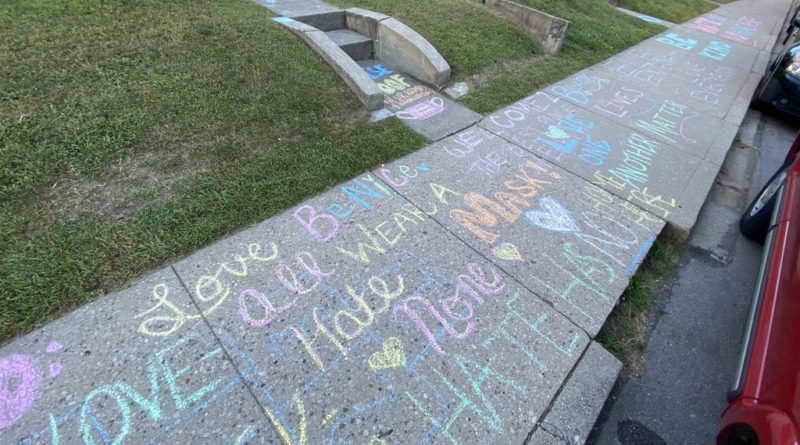UD nationally recognized for efforts against racism on campus
UD recognized for increasing efforts against racism, photo featuring counter messages of love written on campus courtesy of Flyer News.

Kaitlin Lewis
News Editor
The University of Dayton was recognized by INSIGHT into Diversity magazine for its commitment to address bias and support inclusion efforts on campus.
On Sept. 1, UD was announced as one of 90 recipients of the 2020 Higher Education Excellence in Diversity (HEED) Award by INSIGHT magazine, the only national award that recognizes colleges and universities for making diversity and inclusion a top priority.
Dr. Lawrence Burnley, vice president of Diversity and Inclusion, said that multiple initiatives at Dayton led to UD’s recognition.
“The work associated with the award enhances UD’s ability to deliver on its promise of the very best education, one that positions students to learn, lead and serve for the common good,” Burnley said.
One of the most recent initiatives related to this award is the creation of the Institutional Bias Response Advisory Team (IBRAT), which Burnley co-chairs along with Associate Dean of Students and Executive Director of the Multi-Ethnic Education and Engagement Center Merida Allen.
IBRAT’s mission is to evaluate incidents of harassment and discrimination as soon as they are reported to UD and advise the university on their response.
This fall, at least three racist messages have been found and reported on campus — an example of an incident IBRAT was created to help address.
Executive Director for Equity Compliance and Title IX/Section 504 Coordinator Kim Bakota told Flyer News that as of now, UD does not know the individuals responsible for the messages.
While there is still an ongoing investigation from UD Public Safety, most of UD’s response to the messages include enacting change to deter future harassment from occurring.
“Historically at UD, the bias-related processes we’re just focused on responding,” said Dr. Leslie Picca, professor of sociology as well as co-chair of the Inclusive Excellence Council and president of the Academic Senate.
“There has been a huge shift at UD lately, and I would argue under Eric Spina’s leadership, that’s not just responding but also prevention and education.”
One example of taking action through education is the creation of Inclusive Excellence Academy, a learning series offered to faculty and staff that encourages dialogue about racial tensions and systematic racism.
Picca said that the Common Academic Program is also making progress to better educate students and recently hired a new coordinator for diversity and social justice.
UD has also implemented changes at the policy level that will enact advancements in diversity and inclusion university-wide, Burnley said.
The Flyers Plan for Community Excellence Strategic Plan for 2020-2024, developed by the President’s Diversity and Inclusion Assessment Task Force, works to transform hiring, professional development and related efforts to inclusivity on campus. Burnley also said that specific university departments are developing their own strategic plans to align themselves with the greater campus plan.
A campus-wide change is not possible overnight, however, and Burnley said he understands when students may become frustrated when they don’t see immediate action being taken in incidents such as the racist messages found on campus.
Burnley said he knows students sometimes want something “that we can’t give them, such as names and consequences.”
“For the person who may be the object of a racist or bias-related incident, that might not be a lot of comfort because I’m in the moment dealing with pain,” Burnley said.
“But these changes, these impacts at the systemic and structural level, it really does take time.”
Bakota echoed that while it’s frustrating to not know who is responsible for incidents of harassment, she believes education is a good way to prevent similar offenses in the future.
“Having spent a couple of years talking to individuals who have engaged in harmful and problematic behavior, it also speaks to privilege a little bit that someone thinks they can do these types of things and it’s just a joke,” Bakota said.
“They don’t understand how many emails I get afterward from people that ask, ‘Should I be afraid? Am I going to be harmed?’”
Both Burnley and Bakota added that students’ responses to harassment on campus are critical to enacting campus-wide change in the future.
In response to the racist messages found this semester, multiple counter messages affirming Black Lives Matter and inclusivity were written around the student neighborhood in chalk. Moving forward, Burnley said student actions paired with UD’s initiatives will help deter individuals who may think about expressing offensive behavior in the future.
“It really takes the community, not just the administration, to work together,” Burnley said.

